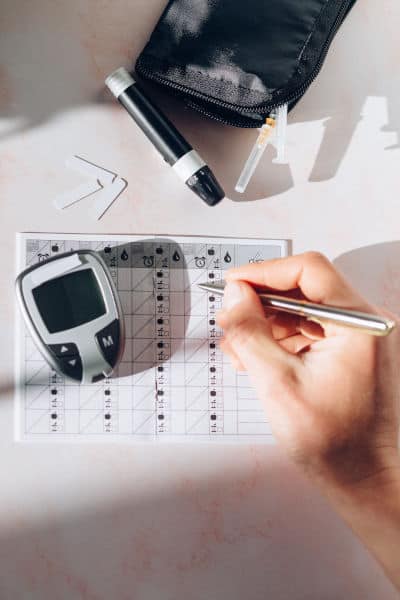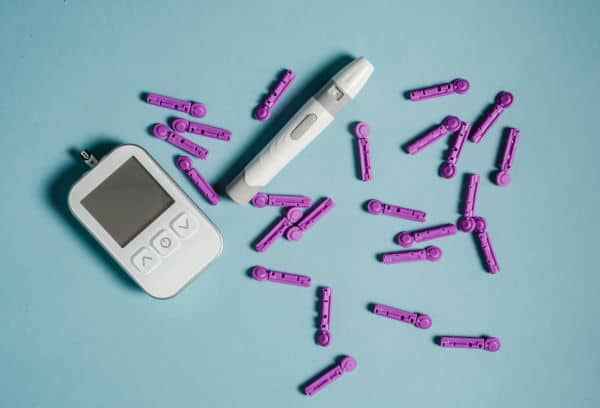Living with diabetes can be a life-altering experience that comes with both benefits and challenges. In this comprehensive blog post, we will delve into the various aspects of living with diabetes. We will discuss the advantages, such as improved self-awareness and better health management, as well as the hurdles that individuals with diabetes often face. By understanding the benefits and problems associated with diabetes, we can develop strategies to enhance the quality of life and overcome the challenges that come our way.

Benefits of Living with Diabetes
Enhanced self-awareness and health consciousness
Regularly monitoring blood sugar levels using a glucometer or continuous glucose monitoring (CGM) system provides insights into how certain foods, activities, or stress levels affect blood sugar. The CGM is highly recommended since it does the hard work for you and keeps a better record than finger sticks. The CGM will also show you the trends after eating certain types of foods, stress, or activities.
Keeping a diabetes journal or using diabetes tracking apps helps track trends, identify patterns, and make informed adjustments to medication, diet, and lifestyle. This is hard to do, for me at least. But talking with a professional advisor, the journal helps them see things you might not know about and can give you better advice to maintain healthy blood sugars.
Consulting with healthcare professionals and participating in diabetes education programs provide valuable knowledge and empower individuals to take control of their health. This is fine, however, it requires spending a lot of, possibly expensive, trips to the doctor’s office. In reality, you are your own doctor. You manage the foods you eat and know better what your blood sugars do. You also know how much exercise you do and know what happens while or after your exercise session. It’s ok to make small adjustments to your basal and bolus rates to help you maintain better control.
Development of healthy lifestyle habits
Engaging in regular physical activity, such as walking, swimming, or cycling, helps maintain weight, improve insulin sensitivity, and promote overall cardiovascular health. Exercise is the most important element of a healthy lifestyle. Exercise reduces insulin resistance which means you use less insulin. Using less insulin helps your body work better overall, including preventing dementia or Alzheimers.

Adopting a balanced and nutritious diet, focusing on whole foods, lean proteins, fiber-rich carbohydrates, and healthy fats, supports stable blood sugar levels and overall well-being.
Practicing portion control, mindful eating, and meal planning ensures a well-balanced diet and supports glycemic control.
Improved nutrition and dietary choices
Learning about carbohydrate counting and the glycemic index helps individuals make informed food choices, manage blood sugar levels, and reduce the risk of post-meal spikes. This is key to preparing your bolus for every meal or snack. Knowing what your blood sugar is prior to the bolus allows you to make an informed decision, for example, not making too big of a bolus that will cause a low after a meal.
Incorporating foods with a low glycemic index, such as whole grains, fruits, and vegetables, provides sustained energy and supports stable blood sugar control. Incorporating healthy foods into your meals can be hard to do if you haven’t made those choices before. Explore those options and slowly make those changes. It does not need to be a sudden drastic change. As you see the benefits of better control it will make the healthy food choices easier in the long run.

Exploring diabetic-friendly recipes and meal plans provides inspiration and guidance for preparing delicious and nutritious meals. For me, I have not changed my meal plans. I have to make sure however when eating great food I don’t overeat amazing food. I am the only diabetic in the family and forcing everyone to eat low-sugar meals is not very fair. Mostly we eat healthy by most standards and portion control is the key to living with non-diabetics.
Regular exercise and physical fitness
Engaging in aerobic exercises, strength training, or yoga can help improve insulin sensitivity, reduce blood sugar levels, and enhance overall fitness. Exercise is lacking in many lifestyles, and many people who make resolutions to go to the gym fall off after several weeks. Why? Because it’s not exciting, or it’s hard or it’s a drudgery. So, find something else that does the same thing but you are excited to do it. I chose Rock Climbing. It’s been the one thing that gets me to the gym with excitement.
Working with a certified diabetes educator or exercise specialist can provide personalized exercise recommendations and guidance on safe and effective workout routines. There are lots of personal trainers if you want one. Find one who understands diabetes and will keep you excited or see some results. I can recommend Hardin Fitness, Lance is an awesome trainer.

Participating in diabetes-friendly exercise programs or support groups encourage physical activity and fosters a sense of community. Personally, I have yet to find a group. I will be posting hikes on Beyond Type 1 in the Colorado Springs area. Beyond Type 1 is an online community where you can post messages or questions and get informed answers in a matter of minutes.
Heightened resilience and self-discipline

Managing diabetes requires discipline in adhering to medication schedules, blood sugar monitoring, and healthy lifestyle practices. Self Discipline can be the hardest thing to learn for most of us, especially me. Diabetes forces a loose form of discipline, mostly because you have to. You need to check your blood sugar. You need to take insulin, or else. As time goes by you may or may not get better, hopefully you do. Some people become hyper-disciplined because of diabetes.
Overcoming the daily challenges of living with diabetes fosters resilience, adaptability, and a proactive approach to managing one’s health. Go on a road trip, you will discover resilience and adaptability. I still forget something with most activities. Sometimes, I have even forgotten the insulin. You will learn to organize and be prepared. Diabetes will force you to remember after you have had some emergency and don’t want that to happen again.
Achieving personal goals related to diabetes management, such as weight loss, improved A1C levels, or successfully navigating social situations, boosts self-confidence and motivation. When I got my first pump, my blood sugars were all over the place. I went from an 8 A1C to a 6.5 A1C in a month. That was a good doctor’s visit. Recently however I need to get things back into control.
Stronger support networks and a sense of community

Joining diabetes support groups, both online and offline, connects individuals with others who share similar experiences and challenges. You feel alone, we all do. There are groups out there. There are local groups and online groups. The online group I recommend is Beyond Type 1.
Engaging in diabetes-related events, conferences, or workshops fosters connections and provides opportunities to learn from experts and fellow community members. Before the pandemic started I had resolved to start attending walks for diabetes, then the world shut down, and all events were virtualized. They are still virtualized but some cities are getting in-person walks back up and running.
Social media platforms dedicated to diabetes advocacy and support allow individuals to connect with a larger community, seek advice, and share their own experiences. YouTube has a wealth of information. A quick search on YouTube and there are several active YouTubers still posting content. Try my channel at Alpine Diabetes.
Challenges of Living with Diabetes
Blood sugar management and fluctuations
Hypoglycemia and hyperglycemia pose significant challenges in maintaining stable blood sugar levels. Both of these feel horrible. Without a CGM it is more difficult but manageable. Always carry a snack, always, for lows when they creep in. Highs take a little longer to recognize unless you check regularly but a correction bolus should help. See my other blog post on persistent highs.

Continuous glucose monitoring (CGM) systems provide real-time data and alerts for more accurate and timely intervention. The CGM is a game changer, if you don’t have one, get one. It keeps you out of trouble sooner. A closed-loop system like the Medtronic or Tandem pumps will take care of the highs and lows for you, but you may have to help it on occasion.
Effective insulin administration techniques, such as insulin pens or insulin pumps, help individuals manage insulin dosages more precisely. I resisted for a very long time to get a pump. I was trying to get away from carrying stuff. You have to sleep with a pump, which was the opposite of not carrying so much. After an event where my wife had to force-feed me food to raise my blood sugar, I got the pump.
Dietary Considerations and meal planning
Carbohydrate counting and glycemic control require knowledge and awareness of the nutritional content of various foods. Understanding how to read the labels in the grocery store helps to identify the foods you should stay away from. Compare white rice to brown rice, as an example. Or even look at the carb count of a bagel and compare that to your biggest meal during the day.

Consulting with a registered dietitian or certified diabetes educator can provide guidance on creating personalized meal plans that meet individual needs. Most healthcare systems have dieticians and educators that you can get time with. They will help you get started. It is a separate trip to the doctor, but early on you are overwhelmed with everything you need to learn. They will help focus on the things you need right now.
Apps and online tools specifically designed for diabetes management can assist in tracking carbohydrates, meal logging, and providing nutritional information. This refers back to the discipline topic above. If you want to track all your meals, go for it. For the undisciplined, it falls by the wayside quickly. The tools help to find trends but it can be a chore of yet another thing to do in the long list of things you have to do.
Emotional and mental health
Diabetes distress, including feelings of frustration, anxiety, or burnout, is common among individuals living with diabetes. Yep, this happens. Your body will bring to the brink of disaster where you have no choice but to take care of yourself. Managing your diabetes well will keep these feelings from cropping up but it is an ever-changing disease. Once you figure it out, your body changes and you have to figure it out again.
Seeking support from mental health professionals or joining diabetes support groups can provide a safe space to share experiences and receive emotional support. If it gets overwhelming for you please seek care. People have lived and are living longer lives with diabetes. I hope that I am proof that you can still live, go on adventures and thrive as a diabetic. Diabetes Can’t Stop YOU!

Adopting stress management techniques such as meditation, mindfulness, or engaging in hobbies helps reduce stress levels and promotes emotional well-being. You may not have taken on some activity because you think diabetes prevents you. That is a lie. You can do just about anything you want. Think of the activity you have always wanted to do and go do it. Comment or ask questions on how to get started, and I will help you.
Long-term complications and health risks
Diabetes increases the risk of developing long-term complications such as neuropathy, retinopathy, and cardiovascular issues. Yes, it does, if you don’t manage your blood sugar. Get your levels back under control so you can get back to living your life.
Regular medical check-ups, including eye examinations, foot care, and screenings for kidney function, help detect and manage potential complications. My doctor wants to see me twice a year for exactly that panel of blood tests. If you are having trouble seeing, the eye doctor can check for the beginning of retinopathy. Keeping your sugar from going wild will keep your retina in the back of the eyeball.
Following preventive care guidelines, such as maintaining blood pressure and cholesterol levels within target ranges, reduces the risk of complications. This is true for everyone.
Financial Implications and insurance coverage

Diabetes supplies, medications, and healthcare services can impose financial burdens. Healthcare is available for those that qualify under Medicare. I have always gotten a job that has healthcare so I am always covered for supplies and equipment.

Exploring insurance coverage options, including prescription drug plans and durable medical equipment coverage, helps reduce out-of-pocket expenses. Companies that provide healthcare each have their own version of coverage, most, in my experience, don’t seem to like diabetics too much. A very small set of companies I have worked for have full coverage, and I don’t have to pay for DME. Unfortunately, it’s not every company.
Seeking financial assistance programs or patient assistance programs provided by pharmaceutical companies can offer financial relief. There are several sites that offer guidance on this, here is one National Institute of Diabetes and Digestive and Kidney Diseases.
If you need insulin try here for guidance. AACE PRESCRIPTION AFFORDABILITY RESOURCE CENTER
A Google search will get you many more resources if these don’t help, reach out there are people who can help.
Strategies to Enhance Quality of Life
Education and self-management
- Participating in diabetes education programs or working with diabetes educators help individuals gain knowledge and skills to effectively manage their condition.
- Setting realistic goals and creating action plans, such as tracking blood sugar levels or increasing physical activity, supports self-management efforts.
- Using technology and mobile apps designed for diabetes management, such as glucose tracking apps or insulin dose calculators, streamlines self-management tasks.
Support systems and peer networks
- Joining local or online support groups allows individuals to connect with others who understand the challenges of living with diabetes. You are not alone!
- Seeking guidance and support from healthcare professionals, including endocrinologists, dietitians, and diabetes educators, ensures personalized care and assistance.
- Engaging in social media communities or forums dedicated to diabetes advocacy provides a platform for sharing experiences and receiving support.
Stress management and self-care
- Prioritizing self-care activities, such as getting enough sleep, engaging in relaxation techniques, or pursuing hobbies, reduces stress and promotes well-being.
- Seeking professional help, such as counseling or therapy, can assist in managing diabetes-related stress or emotional challenges.
- Building a strong support system of friends, family, or mentors provides a network of individuals who can offer emotional support during difficult times.
Incorporating physical activity
- Finding physical activities that are enjoyable and sustainable encourages regular exercise.
- Setting fitness goals, tracking progress, and celebrating achievements help maintain motivation.
- Partnering with a workout buddy or joining group exercise classes adds accountability and enhances the social aspect of physical activity.

Conclusion
Living with diabetes presents its unique set of challenges, but it also offers opportunities for personal growth, improved health, and increased self-awareness. By understanding the benefits and problems associated with diabetes, individuals can take proactive steps to manage their condition effectively and enhance their quality of life. It is crucial to stay informed, seek support, and adopt a positive mindset while navigating the journey of living with diabetes. Remember, with the right strategies, resources, and a strong support system, it is possible to thrive and lead a fulfilling life despite the challenges diabetes may present.

Diabetes Can’t Stop Us!
Comment below if you have any questions or need help, you are not alone.
Not a doctor, RN, or Certified Trainer, just a diabetic trying to improve the lives of others and hopefully help you succeed in your journey.